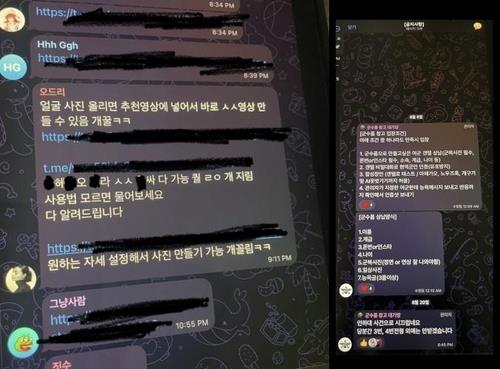 |
This composite image shows screenshots of Telegram chatrooms related to deepfake pornographic content. (Yonhap) |
Three out of 10 deepfake victims who sought help from a state agency tackling digital sex crimes were minors, officials said Wednesday, underlining the seriousness of such crimes.
A total of 781 deepfake victims asked for help from the Advocacy Center for Online Sexual Abuse Victims between Jan. 1 and Sunday, and 288 of them, or 36.9 percent, were minors, according to the Women's Human Rights Institute of Korea under the gender ministry.
The number of underage victims of deepfake crimes represented an increase of 4.5 times from 64 in 2022, while the total number of victims increased 3.7 times from 212 to 781 during the same period, according to the institute.
Deepfakes refer to doctored photos, videos or audio taken from content on social media or other means without people's consent, often created in a sexually explicit way and distributed online.
"Those in their teens and 20s are relatively used to online communication and relationship formation through social media compared to other age groups," an official from the Advocacy Center for Online Sexual Abuse Victims said.
"With the advancement of deepfake technology and the emergence of generative AI, technology has been made widely available to make illegal videos, and related damage is growing," the official added.
Victims of such crimes involving deepfakes can report them and apply for help via a phone call or through the website of the center for online sexual abuse victims. (Yonhap)







![[Today’s K-pop] Blackpink’s Jennie, Lisa invited to Coachella as solo acts](http://res.heraldm.com/phpwas/restmb_idxmake.php?idx=644&simg=/content/image/2024/11/21/20241121050099_0.jpg)